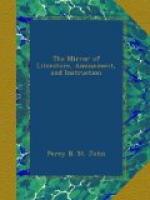The awful flourish of drum and trumpet was sounded;—their majesties of Denmark, attended by their train of courtiers, walked on. There is a pause! All eyes are bent in eager gaze to catch the first glimpse of the new Hamlet—all hands are ready to applaud. He appears—boxes, pit, and gallery, join in the generous welcome of the unknown candidate. He revives—hastens to the foot-lights—bows—another round of applause—bows again—and again—and then falls back, to let the business of the scene proceed. He looks round, meanwhile, with the swelling consciousness that he is that moment “the observed of all observers,” and tries to rally his agitated spirits; but just as he is beginning to do so, his wandering eye rests upon the ill-omened face of M’Crab, seated in the front-row of the stage-box, who is gazing at him with a grotesque smile, which awakens an overwhelming recollection of his own prediction, that he “would be horribly laughed at, if he did make Hamlet a fat little fellow,” as well as a bewildering reminiscence of the manager’s, that, “by ——, the audience would not stand it.”
It was soon evident they would not, or rather that they could not stand it. But it was not alone his new reading in what regarded the person of Hamlet, that excited astonishment. Mr. Stubbs had so many other new readings, that before he got to the end of his first speech, beginning with, “Seems, madam! nay, it is,” they were satisfied of what was to follow. When, however, Mr. Stubbs stood alone upon the stage, in the full perfection of his figure, and concentrated upon himself the undivided attention of the house—when he gathered up his face into an indescribable aspect of woe—but, above all, when, placing his two hands upon his little round belly, he exclaimed, while looking sorrowfully at it,
“Oh, that this too, too solid flesh
would melt,
(Pat, went the
right hand,)
Thaw, and resolve itself into a dew,”
(Pat, went the
left hand,)
the effect was irresistible. One roar of laughter shook the theatre, from the back row of the shilling gallery to the first row of the pit, mingled with cries of bravo! bravo! go on, my little fellow—you shall have fair play—silence—bravo! silence!—Stubbs, meanwhile, looked as if he were really wondering what they were all laughing at; and when at length silence was partially restored, he continued his soliloquy. His delivery of the lines,
“Fye on’t oh fye! ’tis
an unweeded garden
That grown to seed: things rank and
gross in nature,” &c.
was one of his new readings—for holding up his finger, and looking towards the audience with a severe expression of countenance, it appeared as though he were chiding their ill manners in laughing at him, when he said, “Fye on’t—oh, fye!”
He was allowed to proceed, however, with such interruptions only as his own original conceptions of the part provoked from time to time; or when any thing he had to say was obviously susceptible of an application to himself. Thus, for example, in the scene with Horatio and Marcellus, after his interview with the ghost:—




